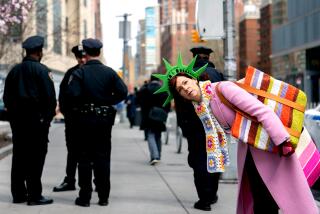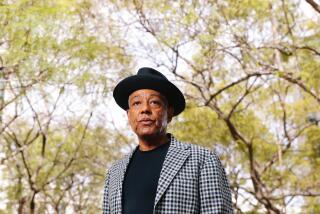Moral quandaries on TV reflect a real-world interest in doing the right thing
Of all the topics TV series may cover, philosophy doesn’t get a whole lot of traction. The reason for this might seem obvious: Big-picture concepts of morality or ethics can seem like the opposite of entertainment. Then there’s Mike Schur’s “The Good Place,” which not only addresses both head on but is a hit heading into its fourth season on NBC.
“When I pitched the show, I said, ‘This is a big part of it — we have an ethics professor and he’s going to be talking about ethics,’” recalls Schur.
To its credit, NBC kept listening.
“Good Place” might be the most obvious example of how topics of morality and ethical behavior can succeed as a TV series’ foundation — but it’s far from alone. Such series as USA Network’s “The Sinner,” TBS’ “Miracle Workers,” Netflix’s “Russian Doll,” CBS All Access’ “The Good Fight,” AMC’s “Better Call Saul” and even an action series like NBC’s “The Blacklist” have either dipped a toe or dived headfirst into those murky waters.
And not only are their audiences still awake, they’re responding — something “Better Call Saul” and its predecessor series, “Breaking Bad,” noticed starting a decade ago. Both series run on a mission statement of showing audiences how an average man goes rotten, given the right circumstances.
We know we’re on to something when there’s a dilemma about what is the right thing for these characters to do.
— ‘Saul’ co-creator/co-showrunner Peter Gould
“We spend a lot of time in the writers room talking about what is the right thing for these characters,” explains “Saul” co-creator/co-showrunner Peter Gould, who also worked on “Breaking Bad.” “We know we’re on to something when there’s a dilemma about what is the right thing for these characters to do. I had a writing teacher who once said that there is really only one subject: How do you live a life?”
The discussion of ethics has filtered into more conventional procedural-style series like “Blacklist.” A recent episode called “The Ethicist” focused on a man hired by a corporation to place a value on human lives to justify the company’s risky decision-making.
“That idea was so weird to me and weirdly corrupt, that someone could decide morality on behalf of a corporation — that just seems broken,” says creator Jon Bokenkamp. “That’s where the episode started.”
But why now? Not that shows haven’t tackled big questions of life and how to live it before, but the discussion seems more upfront today. “Good Place” regularly drops real-life moral philosophers’ names and works, for example. Robert King, who co-created “The Good Fight” with wife Michelle King, suggests it’s the result of showrunners having greater creative might, coupled with viewer fragmentation.
“I think it’s about the authorial voice; we have more individual writers now, and they have power,” King says. “And streaming has more need for niche storytelling and moralizing. So showrunners can put these concepts out there and not turn off an audience.”
But it’s also about changes in the audience. “A lot of people are more defeatist than I’ve ever seen in my lifetime,” says “Miracle Workers” creator Simon Rich. “People are gravitating toward shows that try to posit some kind of explanation for the deeply flawed world we find ourselves in.”
What gets me excited about doing the show is where I see the opportunity to broaden the boundaries of what people thought they could identify with.
— ‘Sinner’ showrunner and creator Derek Simonds
“It is a generational thing,” says Leslye Headland, “Russian Doll” co-creator (with Amy Poehler and star Natasha Lyonne); on “Doll” the two leads, trapped in a cycle of death and repeating bad behavior, spent time in intellectual discussions over their existential crisis.
“There is this shift with the younger generation; they’re less interested in meanness and satirical takedowns of particular behavior,” she continues. “They’re a lot more earnest than their predecessors — and I mean that in the most positive way.”
It’s also important not to underestimate the effect the last two years of politics have had on both audiences and writers. “The more politicians turn their backs on us,” says King, “the more we’re left wondering what do we owe each other. If a president ignores the issues, everyone else has to take up the slack.”
And with their authorial voices raised among some of the highest-quality, sophisticated TV we’ve ever had, writers are hoping their viewers might take away some personal insights. “What you hope is that drama illuminates real life, and gives you a different perspective, not just on the characters’ actions — but maybe your own actions,” says Gould.
“I want to feel like what I do has meaning beyond just entertainment,” says “Sinner” showrunner and creator Derek Simonds. “What gets me excited about doing the show is where I see the opportunity to broaden the boundaries of what people thought they could identify with. Hopefully, it will resonate with them. And hopefully, they might be less likely to judge — both themselves, and others.”
FULL COVERAGE: Get the latest on awards season from The Envelope »
More to Read
From the Oscars to the Emmys.
Get the Envelope newsletter for exclusive awards season coverage, behind-the-scenes stories from the Envelope podcast and columnist Glenn Whipp’s must-read analysis.
You may occasionally receive promotional content from the Los Angeles Times.






